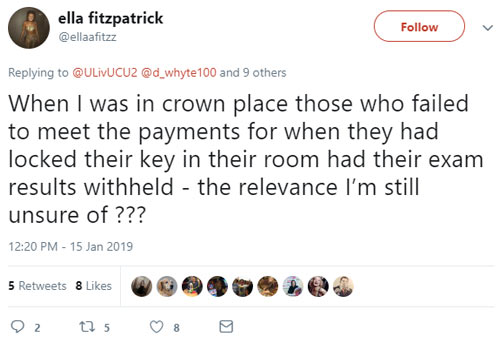University imposing “academic sanctions” on students unable to pay rent
Affected students report being unable to access the library and having exam results withheld, and at least one student has dropped out as a result.

Credit: Ashleigh - Flickr
The University of Liverpool has come under fire after it emerged it has been imposing "academic sanctions" on students in halls who are unable to make rent payments in full or on time.
First uncovered by The Tab Liverpool, official stats from the university itself reveal that in the academic year 2017/18 a total of 687 students were placed under such sanctions having been unable to make rent payments.
The university is continuing to implement the measures this year, with the Liverpool Guild of Students confirming to us that a number of students have been contacted and threatened over rent instalments that were due on 10th January.
The University of Liverpool has responded by highlighting the financial support it gives to students from disadvantaged backgrounds, and pledging to review its policy of imposing academic sanctions on students who are unable to pay their rent.
What are the academic sanctions being implemented?

"Academic sanctions" is a fairly broad term, but the most common example we've seen from affected students is being denied access to the university's libraries.
That said, in many cases the measures don't stop there. Other students say they've been unable to use the university's computers and printers, and have even been blocked from using the WiFi on campus and in halls.
The sanctions appear to be used for more than just missed rent payments, too.
Multiple students have said that the University of Liverpool resorts to these measures when students fail to pay for a replacement room key, with one student alleging that those who didn't cough up "had their exam results withheld".
What effect do the academic sanctions have?

Perhaps unsurprisingly, the students who have been placed under academic sanctions tend to struggle with their studies.
The 687 students (one in six of the total number of students in halls, according to the Liverpool Guild of Students) who faced academic sanctions last year were 12.9% less likely to progress to the next year of their course or graduate.
They were also twice as likely to resit exams or repeat the year, compared to students who didn't face the academic sanctions.
And these sanctions affect far more than just academic performance.
We spoke to Soph, a University of Liverpool fresher and Roscoe & Gladstone halls resident in 2016/17, whose mental health suffered so much as a result of the university's actions that she eventually dropped out.
I set up a direct debit to pay for my halls, but as I only got in through clearing, I got my loan late because I was late setting up my Student Finance. So on the rent payment date, the direct debit bounced.
I didn't realise I hadn't paid for my first term of accommodation as I wasn't informed in any way. I was only 18 and pretty financially inept – I'd spent my entire first term of loan, including the money that was supposed to pay for my rent.
At this point, I had received my second term of loan, and had just paid for my second term of accommodation. I tried to go to the library to do an essay and my card didn't work – I wasn't allowed in.
Interestingly, Soph isn't the only student didn't even know the sanctions existed until being placed under them.
A student who lived in Crown Place, who has asked to remain anonymous, told us she only found out that she was under academic sanctions when she went to the administrations office to complain that she couldn't use the computers, printers or WiFi on campus.
Her missed rent payment (just one day late) was also the result of a direct debit mix up, and although she made the payment as soon as she found out, the university told her that it would take a few days to process. Her access to the university facilities wasn't restored until the payment had cleared.

While it's reasonable to expect some consequences for missing rent payments, part of the issue for Soph was that the university didn't alert her to the problem until long after the event.
I checked my email and found an email informing me I owed the university £1,700. They didn't tell me until February that I hadn't paid the rent due the October before.
I went for a meeting with the university and had to take £200 out of my savings and take out an overdraft. They agreed to let me pay my remaining debt by letting them keep my entire bursary (£1,000).
Despite finding the funds to pay the university back, the stress of the whole ordeal made Soph feel as though she couldn't go back to the university.
I never completed that essay and ended up dropping out.
But I couldn't drop out until May when my bursary came, otherwise I would have had no way to pay my debt, so I still had to pay for my accommodation even though I didn't attend university at all after February.
My accommodation was catered so it was super expensive, at like £145 per week. But since I had already left the halls and gone home, I still had to pay for food as well as the rent, hence my overdraft was completely maxed out.
Because of the debt I was consistently into my overdraft from the February when it happened all the way through to September. I had £500 of overdraft to last me this period. I quickly maxed out my overdraft at -£1,000.
I had to borrow money off my boyfriend, and I still frequently dip into my overdraft because of this as I found it difficult to save up the £1,000 to get out of the overdraft.
Soph is now enrolled on a course at a different university, but says that at the time, the events took a toll on her mental health.
My mental health definitely suffered. I already had mental health problems and I couldn't face returning to the university after this.
I would frequently cry, because I knew it was my fault. My mum had given me money in my first term which I had completely spent, so I couldn't face telling her about the debt. I had to pay it all myself.
What needs to change?

In 2017/18, around 16% of students in the University of Liverpool halls were placed under academic sanctions for missed rent payments. This is in stark contrast to the national average rate of students missing rent payments, which stands at just 1.7%.
A recent study by The Times found that the university's halls are among the most expensive in the UK, and the Liverpool Guild of Students believes that this needs to change. They told us:
The University of Liverpool must address its extortionate rents in halls of residence, which are ultimately leading to one in six of its students falling into rent arrears in halls.
The Guild of Students launched the Cut the Rent campaign this year because the current rent and sanction regime is damaging students' education and welfare completely unnecessarily.
While Soph was able to forgo her student bursary to pay the university what she owed, others have reported that they were not offered any flexibility or payment plans.
One student, who has also asked to remain anonymous, lost her key and received a letter under her door telling her that she had 14 days to pay the £10 for a new key. The letter said that if she didn't, she'd be locked out of the library and Vital (the uni's online learning resources service).
The letter was quite straight to the point and only seemed bothered about me paying the bill, and didn't say that if I was unable to pay that there would be help.
They didn't offer a payment plan or even offer to add it to my next accommodation payment, which would've seemed more suitable.
Save the Student's Student Money Expert, Jake Butler, commented:
It's a massive shame that this is happening to so many students, and I'm worried that it may not just be happening in Liverpool.
The universities have a duty of care, especially when sanctions such as this can lead to students dropping out of uni entirely – or worse.
For me the solution is simple. The government needs to hurry up and increase Maintenance Loans to be in line with actual living costs and unis need to reduce rent in student halls.
Arguably more alarming, however, is that the very act of imposing academic sanctions for missed rent payments may not be legal.
Back in 2017 we reported on how universities were refusing to let students with unpaid debts graduate, despite the Competitions and Markets Authority (CMA) deeming it unacceptable.
The Guild says that the CMA's rulings should apply here too, telling us:
The CMA has repeatedly ruled that the use of academic sanctions for non-academic debt, such as rent arrears, is illegal and violates students' rights.
The university should have no more power than any other landlord to recoup monies owed.
When we contacted the University of Liverpool for comment, they responded:
The university is aware of concerns regarding the cost of accommodation and we provide bursaries to UK students with low household incomes to support them with living costs. In the last academic year (2017/18) we provided in excess of £22m in scholarships and bursaries to our students.
The university keeps its approach to academic sanctions for non-payment of residential costs under review and will be working with the Guild and others to discuss this further shortly.
It is currently unclear whether the University of Liverpool is the only UK university to impose academic sanctions for unpaid rent.
Have you been placed under academic sanctions for missing rent payments, either at the University of Liverpool or elsewhere? Let us know by getting in contact.









